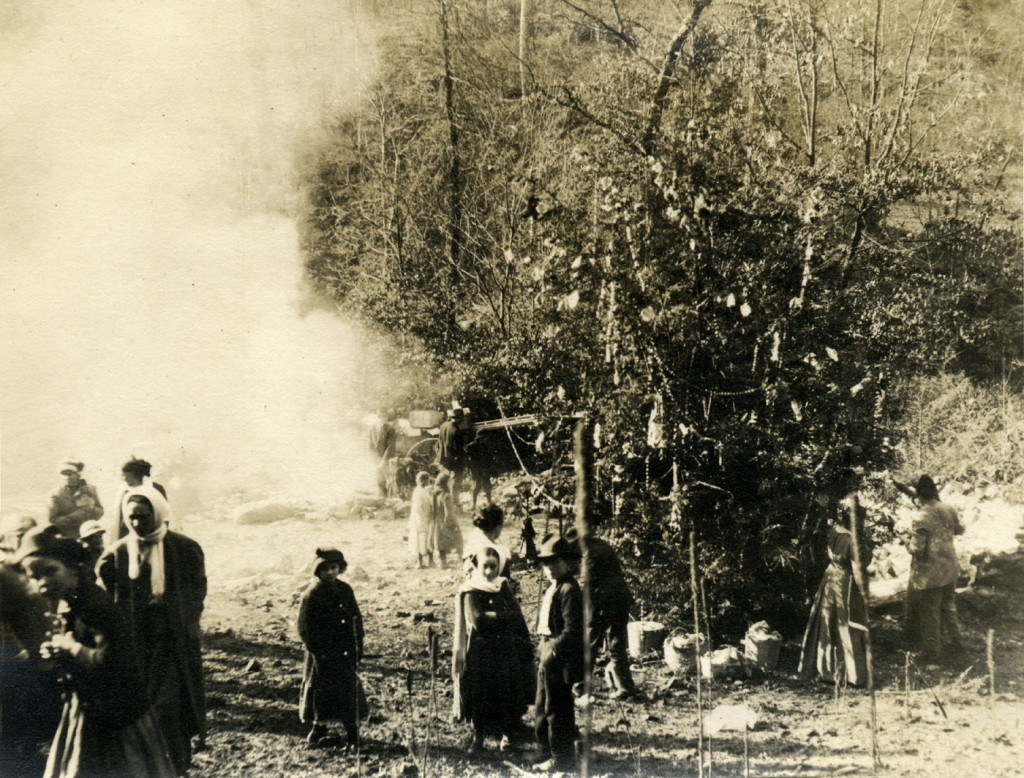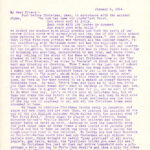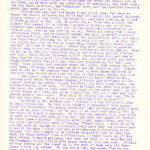Pine Mountain Settlement School
Series 17: PUBLICATIONS – Publicity and Fundraising
“DEAR FRIEND” LETTERS
1914 January 2

Community gathering at Christmas with outdoor tree and bonfire at Pine Mountain. [hook_album_2blk__027.jpg]
TAGS: Dear Friend letters, first Christmas celebration at PMSS, Horace E. McSwain
DEAR FRIEND LETTERS 1914 January
Contents: 1914 January 2
Decorated house for first Christmas ; invited neighbors ; banned drinking ; used dulcimer for carol practice ; parcels post delivered presents ; Christmas Eve visits to neighbors with trees and caroling ; opened presents on Christmas morning ; set up Christmas tree outdoors for neighbors to enjoy ; Santa Claus arrived on an ox ; young people danced ; de Long and Mr. McSwain rode mules to Hell-fer-Sartan along Cutshin with presents ; overnights with neighbors ; last Christmas tree delivered to Line Fork neighbors on Twelfth Night ; lime ; home-grown vegetables
TRANSCRIPTION: DEAR FRIEND LETTERS 1914 January 2
(4 pages)
Page 1 [dear_friend_1914_01_001]
January 2, 1914
My dear Friend:–
Just before Christmas, when, in accordance with the ancient rhyme,
“So now has come our joyfullest feast,
Let every soul be jolly
Each room with ivy leaves is dressed
And every post with holly.”
we decked our windows with holly wreaths and tied the posts of our narrow little porch with spruce, pine and ivy, one of our little school boys referred to our house as “the Christmas House.” And crowded as that little five-room cottage was through all the holiday season, it was overflowing with Christmas cheer and had the happiness to be a center for such a Christmas time as never had been in all our country. For our neighbors, December twenty-fifth has in other years been a day of drinking and shooting, uncelebrated by any tree, any Santa Claus, or any telling of the story of the Babe at Bethlehem. So when we planned to invite every one to the first Christmas tree on the “fur side of Pine Mountain,” we tried to “norate” it about that we did not want any drinking or shooting. When I went to the last day of school exercises at the Big Laurel Schoolhouse the week before Christmas, I asked one of our local advisory board to let it be known that we wanted folks to “be nice”, which with us always means to be sober. To my surprise, after I had made a little speech inviting everyone to come, he rose up for what proved to be a speech on Proper Manners for Christmas Time. He said, “Hit’s been put upon me to tell you folks that the school women don’t want no whiskey on Christmas day. Now, you know Christmas is a great time for drams for us, but we want to try to do what they say. Let’s us drink none on Christmas day, but we take our drams the day before or the day after, and then we will make Christmas twice as long.” So almost total abstinence was the rule of the day out of courtesy to us, and still the Christmas drams were consumed at home.
We began to practice Christmas Carols early in December, and since our new organ has not come then, we learned the melodies by the aid of the old English dulcimer which suited well the ancient song of “The First Noel.” Every night we played by our Victrola, Madam Schumann Heinck’s “Stille Nacht”, and the children sat around the supper table as quiet as mice, learning to love the beautiful song. The post rider came in three times a week loaded with parcels post bundles and had to take an extra nag every time he went across the rough mountain road to the railroad. We hardly see how Pine Mountain or Hell-fer-Sartan could have had any Christmas at all without the parcels post, which brought us safely “play pretties” of all sorts, poppets, gum balls, horns, the “prettiest tricks you ever did see.”
On Christmas Eve just at dusk our entire household made a pilgrimage a mile one way to Uncle John Shell’s and then a mile the other way to Uncle William Creech‘s. To each household we carried a tiny tree gay with tinsel and shining things, and stockings full of presents for Uncle John and Aunt Sis, Uncle William and Aunt Sal. Silently we crept up to Uncle John’s house, lighted the tree, and then sang, “Oh little town of Bethlehem,” “Noel,” and “It came upon the midnight clear.” At the first note Aunt Sis opened her door and stood, a quaint, stooped-shouldered old figure in old time linsey-woolsey, listening in absolute silence. When our songs were done we turned and went away, while…
Page 2 [dear_friend_1914_01_002.jpg]
-2-
…she stood there looking at a sight such as she had never seen before. While the others went on to make ready the tree for Uncle William and Aunt Sal, Miss Pettitt and I stood by the road to watch. Not knowing what to do with so bright a wonder, the old woman went in and closed her door. Some neighbor men, just finishing their day’s work on our farm, came by, and we told them to tell her to take the tree in before the candles burned it up. We still stood watching while they walked around the tree and said, “Ain’t that the prettiest sight you ever did see?” and “I’d love to see that by daylight.” We heard Aunt Sis tell them she just didn’t know how to behave when we all come, how our doin’s was quare to her, and she didn’t KNOW to take the tree in. We heard the men advise her, “No, don’t set it on the bed, you will have to sit it on the floor;” but she told us afterwards that she had “Sot it on the bed” and locked her door, (a most rare proceeding in our country) so as nothin’ shouldn’t bother it, and how everybody had come from all over to see her tree, folks she had never known, folks that had never been in her house before, and she had unlocked the door to show it to them.
We had to make our way to Aunt Sal’s by the aid of fatty pine torches, and after our carols there, we were asked in. The house was full of Aunt Sal’s grandchildren come to “take the night” with her so as to be ready for our big Christmas tree on the next day. You could not imagine a more interesting sight than Aunt Sal, her bandanna over her head, her pipe in her mouth, sitting on the side of the bed pulling little packages out of her stocking with her grandchildren all around her, and she like a queen in the midst.
That night thirteen stockings were hung by our chimney, but the unlucky number did not scare our Santa Claus, who put a doll in the top of every one. He must have heard our eighteen-year-old Will saying that he would like a doll to play with on Sunday afternoons.
In the morning our little boys, Charley and John, promptly sat on the floor to pull out their presents. Each had five little toy cavalrymen down toward the toe. When Charley had pulled out three he exclaimed, “Gee! Oh, if there ain’t a terrible sight of mules!” John absorbed in his own stocking, was setting his up one behind the other, and suddenly he called on us, saying, “Lookie here, the three wise men a follerin’ the star.” He had been learning in school, “We Three Kings of Orient Are,” and had sung it with the greatest delight coming home in the starlight from Aunt Sal’s Christmas tree. Each little boy interpreted the cavalry men after his own fashion and imagination.
We had to put away our play pretties long before we wanted to, to get ready for our Christmas tree. because we had no room large enough for it, it had been set up out doors the day before at the foot of a little hill near the cross roads and not far from a big cliff so that people could find shelter under it if it rained. The young folks for miles around got a “soon start” that morning, and “gathered in and holp” make ready the tree. I suppose it was a beautiful tree to us all because we all had a share in trimming it with baubles that looked as if they had come from fairyland. All the while neighbors were coming from far and near, men with their wives behind them holding wee little babies, and some mules carrying little folks plumb down to the nag’s tail. We had a busy time writing the names for Christmas presents that people had brought to put on the…
Page 3 [dear_friend_1914_01_003.jpg]
-3-
…tree. It hardly seemed possible that our neighbors could have been as pleased with their socks of candy and the gifts the school put on for them, as we were with the pokes full of chestnuts, the fresh eggs, the big sweet potatoes, the “Sasifras” root, and the old-time hunter’s pouch that were put on for us.
No body had any idea how Santa Claus would come, but when we heard the sounds of horns and bells way off behind the laurel thickets people rushed to the cliff, the hillside, the fence post so as to get a first glimpse of him. All we could see at first was a jolly red figure that seemed to be riding a mighty slow mule, but as it disappeared and reappeared from the ivy thickets, we discovered to our intense joy, that he was astride an ox. Never did Santa ride a more deliberate steed, and he himself seemed the most leisurely creature in the world till you discovered that the proverbially swift old saint was impatiently prodding the ox’s side with his heel. I am sure that the people who live on Greasy Creek will always believe Santa Claus had all the time in the world. Never was such laughter as greeted him or such mirth over his unavailing efforts to hurry up the ox. When he got up to the tree everyone called out with one accord, “Christmas Gift, Santa Claus, Christmas Gift”. Fortunately his pack was so full that he had a gift for everybody, but before he could get everything distributed the rain that had been threatening for day came down. Some people took shelter under the cliff, some people hastily rode home, thinking they might as well get wet early as late, others came to see us. We learned that day how to make three chickens do for more than thirty people by the aid of dumplings, gravy, and rice.
The young people spent the afternoon in their favorite way, running sets whose very names suggest hilarity and merriment of the figure, Boxing the Gnats, Caging the Bird, The Wild Good Chase, and Killie Crankie is My Song. Of course we could not send them home in the rain, for some of them came from eight or ten miles away. So our little house with only one extra single bed, let out a reef and kept eleven guests that night. They said on leaving the next day, “We’ve had the best time. We did not know you folks were so clever.”
On Saturday Mr. [Horace E.] McSwain and I started for our fifty-mile trip to Hell-fer-Sartan. We felt like knights of Malory’s time, going forth for adventure, for people predicted that Cutshin and Middle Fork would be up past fording, but we said if we could not have a tree in one place we would in another. We filled our pockets with tiny gifts in case we found children on the way, and down the length of Cutshin we found them a plenty. Children with bright, eager faces, not shy but with the prettiest ways of saying, “Thank you”. I wish those of you who sent us things to distribute could have seen the pleased surprise of the many little boys and girls who had a Christmas trick dropped into their hands by us unknown strangers, and the way they held the “play pretty” like a little bird in their hands as if they were afraid it would get away, and then ran with it to show Maw and the younguns in the little gray house back up from the road. Cutshin is very remote and the homes on it are most of them very old fashioned little log cabins. No one would take any money from us for meals or lodging but said,…
Page 4 [dear_friend_1914_01_004]
-4-
…when we asked what we owed, “Nothin” but to “come again.” I am sure no home could look more inviting than the one we reached on Sunday night, a great old log house with glowing fire light shining on the snow through its open door and its two windows. As we stopped our mules, the widow Begley came out to the gate and bade us “light and stay all night.”
Sitting in front of the fire after our good supper of fresh country ham and honey and biscuit, we heard of her husband just dead, a wonderful old yarb doctor, and how he’d heap ruther have roamed over the hills a hunting him Indian tomahawks and arrows than raised a corn crap. How all such matters as these he was allus a studyin’ about and readin’ books that told on them. He never lost a case of pheumony fever; fust he give Epicac, then he gave three doses of calomel and Rheubarb and Epicac, then yarb teas and oil, and in a week he’d have ’em able to walk wherever they was wantin’ to. We brought away two treasured relics of the old man Begley, a tiny tomahawk that he studied out the Indians must have used to dress skins with, and a sword captured from a Confederate officer in the Civil War.
Next morning when we rode over, a great party of us, to the little house near Devil’s-Jump-Branch that runs in to Hell-fer-Sartan, we found the tree set up and the room garnished with spruce pine. We turned everybody out while a dozen or more of us decked the tree, and asked everybody please not to look in the windows. You would be amazed to see how even the curiosity did not overcome their wish to do as we asked. The tree was the prettiest one we had ever seen, just the sort children dream about, with dolls and drums and horns and ribbons hanging from every limb. Yet in spite of the joyous laughter with which every one hailed it, there was the utmost quiet in the close-packed crowd while we told the Christmas story, and while the school teacher made a speech of welcome. “These folks have come a long way to show their love and friendship for us, and we want them to know they are welcome. They are welcome, we are welcome, and everybody is welcome.”
Mr. McSwain as Santa Claus had to shake hands with grown women as well as little boys and girls, and enjoyed immense popularity. People wanted to know, when the presents were off the tree, if they might have the ornaments, and in no time the tinsel and the red balls were stripped off, to go into a dozen or more homes, so that the younguns who didn’t know there was going to be such a “tree or they’d a come,” might draw up some notion of it, the prettiest sight that was ever in these parts. People wanted to take us home with them as much as the tree trimmings, and could not imagine why we would not spend a week with them; but we started on our two days’ journey back up Cutshin as soon as the tree was over.
Yet with us the festival season extends over to Twelfth Night as it did in the days of Queen Elizabeth, and our last Christmas tree, to be held over on the head waters of Line Fork, will come on old Christmas Day, January the 6th. It is the common belief in our country that at midnight on the night before, the cattle mourn and low, and kneel down to worship our Lord. Perhaps nobody knows for sure, because they are scared of the solemn feelings they would have — as one eighteen-year-old boy put it, “hit would make you might solemn to see them kneel, — you wouldn’t feel like beatin’ on them no more.” It seemed to us fitting that the holiday season should close with a tree in this remote neighborhood on old Christmas Day.
The girls and boys are mending toys that have come to us broken, fixing eyes in dolls that have been badly shaken, gluing on arms and legs so that the children over on Line Fork will have as fine a Christmas as anybody.
We are sure that our little house can never forget the happiness it has held during our first Christmas season on Pine Mountain.
Sincerely yours,
Ethel de Long
GALLERY: DEAR FRIEND LETTERS 1914 January 2
- 001 [dear_friends_1914_jan_2_001.jpg]
- 002 [dear_friends_1914_jan_2_002.jpg]
- 003 [dear_friends_1914_jan_2_003.jpg]
- 004 [dear_friends_1914_jan_2_004.jpg]
See Also:
DEAR FRIEND LETTERS 1914 November 14
FRANCES LAVENDER Correspondence & Ephemera
DEAR FRIEND Report and Letter 1914 [PRIVATE] – November 21, 1914, & Fall 1914 (Margaret McCutcheon report after a visit to PMSS)
Return To:
DEAR FRIEND LETTERS – Index





